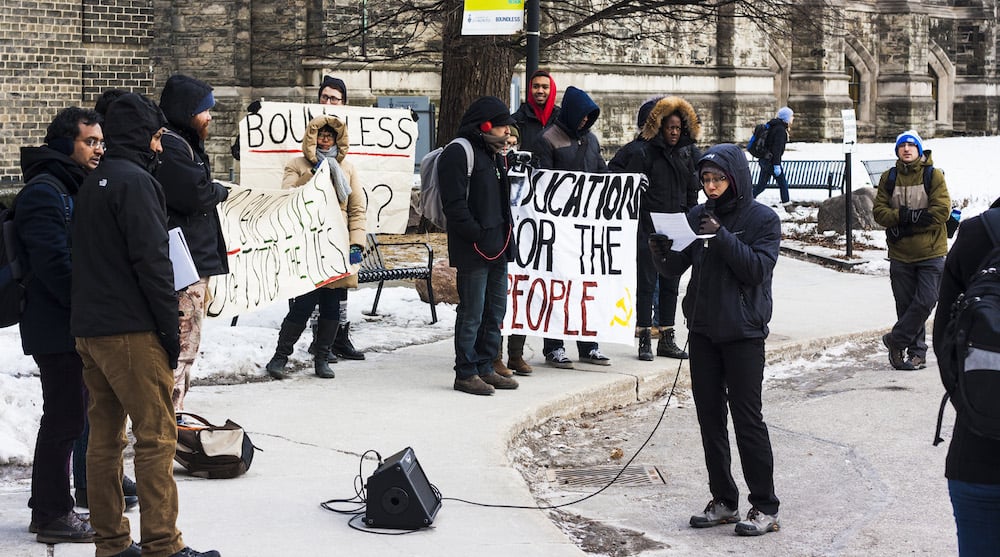Last Thursday, Governing Council passed a motion moving the Transitional Year Program (TYP) from its current home at 49 St. George St. to Woodsworth College. Despite students protesting outside, and last minute appeals from the University of Toronto Students’ Union (UTSU) and the Association of Part-Time Undergraduate Students (APUS), the motion passed overwhelmingly. There were no votes against and three abstentions for the motion. Under the plan, 49 St. George St. will be demolished and serve as the future site for the Centre for Engineering Innovation and Entrepreneurship (CEIE).
Charmaine Williams, associate dean, academic at the Factor-Inwentash Faculty of Social Work, has been appointed as Provost Cheryl Regehr’s accessibility advisor. In the position, she will oversee the TYP’s transition. Both UTSU and APUS have expressed concern over the move for years.
APUS president Susan Froom said she is not opposed to the space at 49 St. George St. being used as a new home for the CEIE, but noted that it should not come at the expense of the TYP. “We’d like to see a similar, fabulous space be created for TYP. That means it needs to have enough space,” she noted. According to Froom, the new home has about half the usable space of the program’s current location.
Froom also expressed concern over the program’s ability to provide the same level of student services, including childcare and academic counseling, at the new home. “We’re not entirely pleased with the vote, in that it didn’t take into account the needs of TYP,” Froom noted. “But there still is time to address this issue.” Froom expressed hope that Williams will address concerns, and urged university administration to continue consultations with TYP students, faculty, and staff.
APUS interim executive coordinator Danielle Sandhu noted that the move was just one in a series of attempted changes to the TYP. “There is a long history of the administration seeking to change the structure and autonomy of the Transitional Year Program, arguing that such changes would benefit the program,” she noted. “However, students, alumni, faculty, and the directors of the program have all been clear: such changes would only undermine the program’s ability to achieve its mandate and deliver support to marginalized students.”
Regehr would not address questions regarding space issues at the new home, or the initial process that picked the site at 49 St. George St., directing questions to Scott Mabury, vice-president, university operations. She also directed questions regarding completion dates for the construction project to Mabury.
A package circulated to Governing Council members by the TYP Preservation Alliance — a coalition of students, alumni, and community members who support the Transitional Year Program — alleged: “This move would put TYP under the administration of Woodsworth College.” Regehr denied these claims. “Everything about the structure of the TYP remains exactly the same,” she said. “It’s only a physical move at this point. There are no plans at all for any kind of administrative restructuring.”
Sandhu took issue with this, noting that in 2009, university administration moved to imbed the TYP in the purview of the Faculty of Arts & Science. “Through protests and lobbying, the move was cancelled,” she noted. “Since then, the program has suffered budget cuts and a reduction in faculty, resulting in the elimination of a number of support services for the students in the program,” she said, adding, “One has to wonder why.”
Sandhu noted that the TYP’s home is a key part of the program’s success. “The space in which the TYP exists is centrally conducive to its success — it is a home for racialised, indigenous, low-income, and socially disenfranchised students and their families,” she noted. “This is a step towards integration in the Faculty of Arts & Science.”
Regehr also maintained that there are no plans to reduce the number of students in the TYP. She did note, however, that Williams is going to conduct a review of the university’s access programs, including the TYP. The review will look at demand and required supports for the university’s access programs.
Sandhu asserted that the university’s consultation with TYP stakeholders have been inadequate. “I have been involved in the Transitional Year Program Preservation Alliance for a couple of years, and I have not seen or heard of the central administration meeting with students, student representatives, alumni and faculty of the TYP to talk about the future of the program,” Sandhu noted. “We have hosted many town halls where we have had over a hundred people attend to talk about the importance of preserving and supporting this program, but have not had the Provost join us to clarify the fate of the program.”
Sandhu called on the university to establish a task force on the needs of the TYP, to be done in consultation with members of the TYP community. She also called on university administration to restore the TYP to its full capacity, in terms of funding and faculty, and keep the program autonomous and distinct from Woodsworth College.
“When we talk about the future of buildings and academic programs, we often talk about the specifications, the efficiency, square meters, streamlining and so on. But the future of the TYP should not come down to a formula,” Sandhu said. “It should come down to a question of the university’s commitment to access and equity, and ensuring that all students regardless of their background, have access to a world-class education.”
For her part, Regehr reiterated her support for the TYP. “There’s been no talk about any change to the allocation to TYP. This is a great program,” she said. “We have a lot of great access programs in different parts of the university, and that is a key part of the commitment of University of Toronto: to ensure that people have access in non-traditional ways, as well as traditional ways.”


